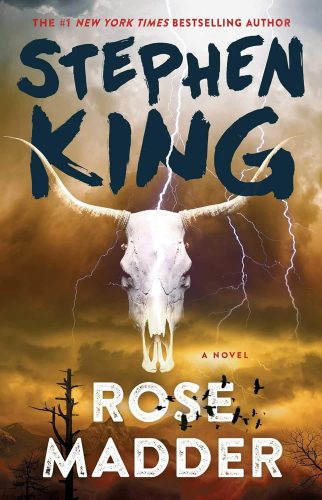 “It ain’t the blows we’re dealt that matter, but the ones we survive.”
“It ain’t the blows we’re dealt that matter, but the ones we survive.”
Author: Stephen King
After 14 years of marriage – of beatings, of blood, of miscarriages and abuse – Rose Daniels finally comes to her senses and walks out of her house, never to return. It isn’t planned, this moment of bravery. She leaves only with the clothes on her back and her husband’s bank card, which she uses to get a ticket out of town and then throws away. Rose is done with Norman Daniels, with his escalating rages, his biting, his fists, and the promise of death at his hands. But Norman is not done with Rose. She has emasculated him. What will his buddies say? Norman will throw everything behind finding Rose and avenging himself. And he has a lot of skills; after all, Norman is a police officer. His resources, his reach, and his network are seemingly limitless. Thus begins a cat-and-mouse game of abuse and escape, found respect and creeping fear, moving on and the ties that bind.
As Rose moves on, she finds the women-lead Daughters & Sisters shelter, where she is introduced to others who have fled similar situations. Slowly, the shelter supports Rose as she finds herself again and her way in the world. Along the way, Rose discovers a painting in a pawn shop that calls to her. It is of an unseen blond woman, her back to the artist, wearing a rose madder chiton, and staring at the collapsing pile of an old temple. Rose brings the painting into her new home, and slowly her obsession with it offers an unlikely escape from her rabid, degenerating husband, who is getting closer.
Rose Madder’s strength is in its realism and Rose’s growth. The opening scene is brutal and tragic, especially because the horror here is not imaginary, but a daily reality for many women. The beating, the objectification, Rose’s downtrodden and broken psyche, is too expertly rendered to allow the reader any quarter or even the thrill of vicarious horror. It’s in-your-face and both the strongest and most disturbing aspect of the book. This is where King really comes through in Rose Madder. Instead of depicting a supernatural baddie, he concentrates on the horrors of the real world, evidenced through Rose’s experience and Norman’s police cohorts, who know about and hide his atrocities, both at work and at home. It’s a strong testament, one that demands us to empathize with Rose and women in these real-world situations. It’s a call to action as well.
Where the book falters is in the presentation of the supernatural, which is usually where King is most comfortable. Rose’s pawn shop painting gradually opens into another world, where Rose eventually finds herself living out a modern Persephone myth, interacting with a goddess crazed by rage, and running from a one-eyed bull that represents abusive men. It’s all a bit strange, a bit of a stretch, and the reader can feel the author trying to make the pieces fit between this other-dimensional world and the real world where Norman tracks Rose and she, in turn, grows into her own person. It’s like trying to smash the pieces of two different puzzles together. What we get is a rough-cut mélange, brutally stitched into a weird picture.
That’s not to say that it is bad, however. The alter-dimensional world has some cool moments (that river that makes you forget, for instance); the bull running through the maze, like a minotaur; the phantastic, half-hazy slip between worlds, where Rose is left to wonder if she is dreaming. We still get into the story, even though we are left to wonder what it is trying so hard to symbolically say (sometimes it is obvious, other times, the connections fail to click.)
The story is stronger, though, in real-world time. Unfortunately, it also starts to get slow. We spend a lot of time with Norman getting closer and going unnecessarily insane (via supernatural intervention and a bull mask). The real world starts to distort and shift. It becomes a bit too unbelievable. Norman is too sloppy, too unstoppable, and Rose is too lucky. It still entertains, but we don’t necessarily believe any of it.
By this point, however, we care deeply for Rose and are invested in her redemption. This keeps us in the tale, despite the over-the-top elements and the slow pace around the half-way point. In this way, the bizarre ending is both satisfying and incomplete. We saw it coming, but we still have questions about this other world, why it called to Rose, and how it is both malevolent towards her and redemptive – a dangerous ally that will turn, insane, at any moment. We’ll end the story, still questioning, and ruing the unnecessary epilogue with its forced female-rage point.
In the end, Rose Madder has a lot of excellent qualities. We love and care about Rose, and the domestic abuse angle is altogether too realistic and tragic, calling us to both empathy and action. The other elements that weave together to take this out of real-world horror and make it supernaturally scary, however, do more harm than good to the story. As King himself has said about this book, it does try too hard. But . . . it’s still King, so it’s good, nonetheless. Worth a read, although not King’s personal best.
– Frances Carden
Follow my reviews on Twitter at: https://twitter.com/xombie_mistress
Follow my reviews on Facebook at: https://www.facebook.com/FrancesReviews
- Book Vs Movie: The Shining - April 6, 2020
- Thankful For Great Cozy Mysteries - December 13, 2019
- Cozy Mysteries for a Perfect Fall - October 20, 2019



